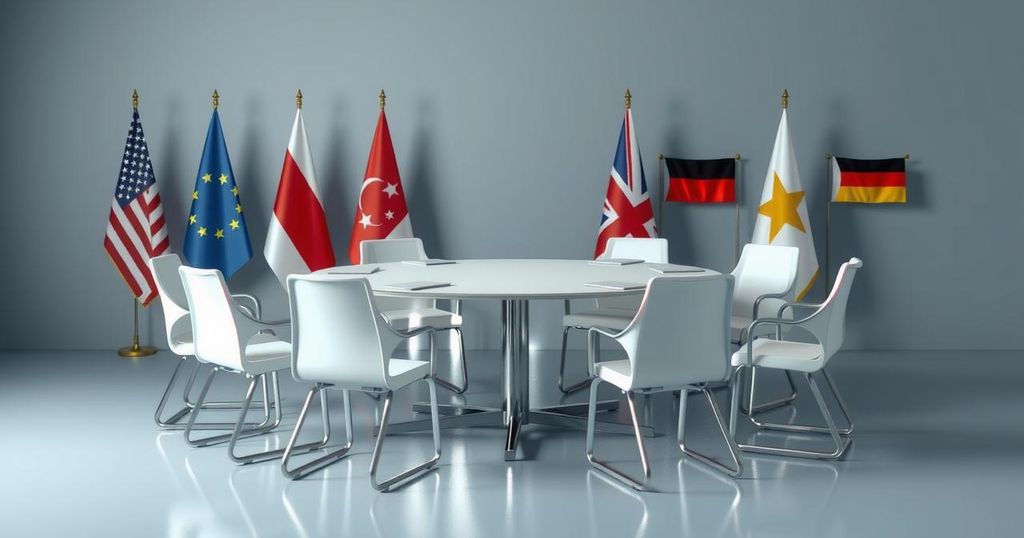President Trump has proposed renegotiating the Iran nuclear deal he withdrew from in 2018, which was originally aimed at limiting Iran’s nuclear capabilities. His recent overture has been rejected by Ayatollah Khamenei, who views it as an attempt at imposing further conditions. The context includes Iran’s perceived weakened position and troubling advancements in its nuclear program, raising international concerns.
US President Donald Trump has reignited discussions concerning a potential new nuclear deal with Iran. Following the unilateral withdrawal of the United States from the Iran nuclear deal in 2018, Trump has proposed negotiations through a letter directed to the Iranian leadership. However, this overture was promptly rejected by Iran’s Supreme Leader Ayatollah Ali Khamenei, who characterized it as a strategy to impose additional conditions on Tehran.
Initially, in 2015, a coalition of global powers including China, France, Germany, Russia, the UK, the US, and the EU reached an agreement known as the Joint Comprehensive Plan of Action (JCPOA) with Iran. This agreement aimed to restrict Iran’s nuclear program in exchange for relief from economic sanctions. Iran committed to limiting uranium enrichment to 3.67% purity, a threshold suitable for civilian use rather than the 90% needed for weapons-grade purposes.
In 2018, President Trump withdrew the United States from the JCPOA, citing fundamental flaws within the deal. He criticized the provisions allowing for future resumption of Iran’s nuclear activities and indicated the agreement failed to address the country’s ballistic missile development and destabilizing regional actions. Subsequently, he imposed stringent economic sanctions, initiating a campaign designed to exert maximum pressure on Iran to negotiate a revised agreement.
In a recent interview on Fox Business Network, President Trump expressed a desire to negotiate a nuclear deal. He stated, “I said I hope you’re going to negotiate, because it’s going to be a lot better for Iran.” Trump emphasized his preference for diplomacy over military action, indicating, “There are two ways Iran can be handled – militarily or by making a deal. I would prefer to make a deal.”
This renewed pursuit of diplomacy may stem from a perceived diminished position of Iran, making negotiations more feasible. Iranian proxy groups, such as Hamas and Hezbollah, have faced considerable setbacks in conflicts with Israel, potentially weakening Iran’s regional influence. Additionally, Israel’s retaliatory military actions against Iranian facilities have also contributed to this perceived decline.
New information from the International Atomic Energy Agency (IAEA) indicates that Iran’s stockpile of enriched uranium has surged to levels exceeding permissible limits, with some enriched up to 60%, nearing weapons-grade levels. These developments have exacerbated global concerns regarding Iran’s nuclear ambitions, especially as Iranian officials have claimed their capability to produce nuclear weapons if desired.
In response, Ayatollah Khamenei has rejected Trump’s negotiation offer during discussions with senior Iranian officials. He contended that the negotiations proposed by the United States are intended not to resolve issues, but to impose dominance. Khamenei elaborated that the demands posed by the US extend beyond nuclear limitations, encroaching upon Iran’s defensive capacities and regional presence. The sentiments from Iran’s state-controlled media, such as Nour News, further reflect skepticism regarding Trump’s intentions, describing his recent letter as lacking originality.
President Trump’s recent proposal to negotiate a new nuclear deal with Iran, following the US withdrawal from the JCPOA, has encountered rejection from Iranian leadership. The backdrop of increasing challenges for Iran internally and externally, coupled with alarming reports about its enriched uranium stockpile, prompts a critical analysis of the geopolitical landscape. Ayatollah Khamenei’s firm stance against US demands underscores the complexities involved in any potential negotiations, highlighting the need for meticulous diplomacy to address underlying issues in this fraught relationship.
Original Source: www.business-standard.com






